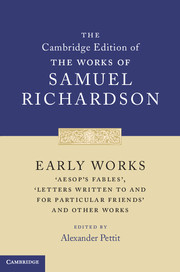Book contents
- Frontmatter
- Dedication
- Contents
- General Editors’ Preface
- Acknowledgements
- Chronology
- List of Abbreviations
- General Introduction
- Textual Introduction
- The Apprentice’s Vade Mecum (1733)
- A Seasonable Examination of the Pleas and Pretensions (1735)
- Preface to Aubin, A Collection of Entertaining Histories and Novels (1739)
- Aesop’s Fables (1739)
- Letters Written to and for Particular Friends (1741)
- Six Original Letters Upon Duelling (1765)
- Appendix: The Infidel Convicted (1731)
- Postscript
- Emendations
- Word-division
- Bibliographical Descriptions of Early Editions
- Explanatory Notes
- Index
Letter XI
Published online by Cambridge University Press: 30 June 2022
- Frontmatter
- Dedication
- Contents
- General Editors’ Preface
- Acknowledgements
- Chronology
- List of Abbreviations
- General Introduction
- Textual Introduction
- The Apprentice’s Vade Mecum (1733)
- A Seasonable Examination of the Pleas and Pretensions (1735)
- Preface to Aubin, A Collection of Entertaining Histories and Novels (1739)
- Aesop’s Fables (1739)
- Letters Written to and for Particular Friends (1741)
- Six Original Letters Upon Duelling (1765)
- Appendix: The Infidel Convicted (1731)
- Postscript
- Emendations
- Word-division
- Bibliographical Descriptions of Early Editions
- Explanatory Notes
- Index
Summary
To a young Man too soon Keeping a Horse.
Dear Tom,
I always take great Pleasure in hearing of your Welfare, and of every thing that makes for your Satisfaction and Comfort: But give me Leave to say, That I am sorry to hear you have so early begun to keep a Horse, especially as your Business is altogether in your Shop, and you have no End to serve in riding out; and are, besides, young and healthy, and so cannot require it, as Exercise. And is it worth while, think you, to keep a Horse the whole Week, that you may have him at hand on a Sunday Morning, if the Day proves fair, and you have nothing to keep you in Town?
You must consider, that tho’ here, in the Country, many common Tradesmen keep Horses, the Expence is but small to them, and the Distance of one Customer from another, in a manner obliges them to it. But this can be no Plea for you: And if you do not want a Horse for Exercise, you can only alledge the worst Reason in the World for your maintaining one; that your Neighbours all round you do the same: For, look who they are, and what their Motives, and you’ll soon see the Difference, and that their Example will not justify you. Mr. Thompson, for Instance, who lives next Door to you, is near Sixty Years of Age, of a pretty gross Constitution, and capable of no other Exercise; and moreover he had acquired, by Length of Time, and Industry, an ample Fortune, before he gave himself this Diversion. Mr. Jenkins has an Estate fallen to him, that sets him above the Want of Trade; and his continuing in it, is rather an Amusement than an Employment.Mr. Jackson, Mr. West, Mr. Trozier, and Mr. Kent, are all Men of established Fortunes; and when you are as old as the youngest of them, and can as well afford it, I would be far from dissuading you from keeping a Horse. But at present, you may depend upon it, you rather incur their Contempt, than gain their Esteem, by offering to appear their Equal, when they and you well know, in what relates to Expences, you ought not to be so, nor have you had a Time for it.
- Type
- Chapter
- Information
- Early Works'Aesop's Fables', 'Letters Written to and for Particular Friends' and Other Works, pp. 348 - 350Publisher: Cambridge University PressPrint publication year: 2011

